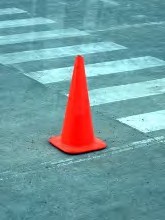 In my town, parallel parking was known as the “skill most likely to rattle” new driving candidates and ultimately cause them to flunk their on-road driving test.
In my town, parallel parking was known as the “skill most likely to rattle” new driving candidates and ultimately cause them to flunk their on-road driving test.
Luckily for me, I was assigned a gigantic pickup truck the day we practiced parallel parking in the student lot for Driver’s Ed class. By the time class was over, I could have wedged the Titanic between icebergs and come out safely on the other side (as long as the icebergs had highly visible orange safety cones sticking up out of the water). Learning to “drive big” served me very well; despite my complete lack of spatial sense or mechanical ability, I passed my driving test with flying colors.
In writing, I actually think the reverse might be true: gaining some early skills with a compact vehicle will serve students beautifully when they move on to test out other rides. Despite their often compact size, which makes poems look more approachable to hesitant student writers (and of course you don’t have to tell them that “approachable” doesn’t translate to “easy”), learning the elements that go into a strong poem will strengthen almost any other kind of writing students do.
Here are a few of the things that I think poems teach best:
- Just a few words, as long as they are the right few, can be enough to convey a strong emotion or experience. While revising, always look for ways you can cut out any excess so that the words you leave behind rise up from the page and grab the reader by the throat.
- Reading is a sensory activity; engage the reader by engaging all five senses.
- Good writing has music to it; play with your language until the words beat out a rhythm or sing a song for your reader.
- Make the reader pay attention; find an unexpected or surprising way to talk about something too familiar or overlooked.
I’ve talked before about how Magnetic Poetry can turn writing into an actual tactile activity that engages even the most reluctant young poets. Hand around cookie sheets and let the writing begin! And if you don’t already have Magnetic Poetry kits, there’s a way students can create their own Magnetic Poetry words (you can buy magnetic tape or pre-cut business-card sized magnets at office supply and craft stores). Or why not create over-sized words so students can turn the sides of your classroom’s file cabinets into poems as well?
National Poetry Month begins in just a few days, and poets will be sharing all sorts of writing tips and tricks online; keep your eyes open for all the fantastic hints and activities that “writing compact” will bring.

Lisa ~ I love your metaphor. The perfect way to describe writing a poem: driving a compact. Thank you!
Thanks so much, April! I love the compact nature of poetry, and the challenge to find those few perfect words that are just enough, but not too much, to say what needs to be said.